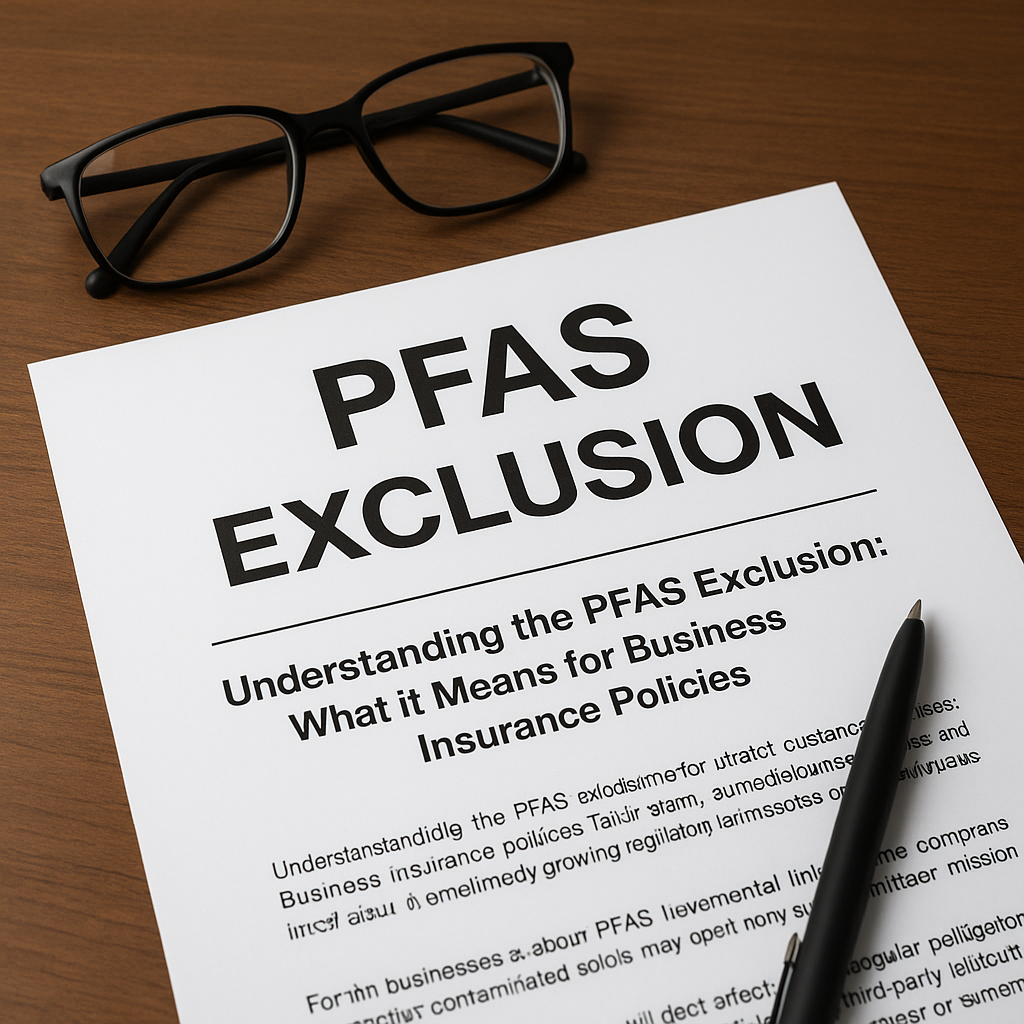
By Jenny Holly Hansen | WBN News | June 4, 2025
In recent years, insurance policies have increasingly included a new exclusion that many business owners may not be fully aware of: the Perfluoroalkyl and Polyfluoroalkyl Substances (PFAS) Exclusion. While it may sound highly technical, this exclusion has very real implications for businesses — especially those involved in manufacturing, construction, food packaging, industrial cleaning, or any industry where PFAS chemicals may be present.
Let’s break it down and look at how it affects your insurance coverage.
What Are PFAS?
PFAS (pronounced P-fass) are a group of synthetic chemicals that have been used since the 1940s. They are valued for their resistance to heat, water, oil, and stains — which is why they show up in a wide range of products:
- Non-stick cookware
- Waterproof clothing
- Firefighting foams
- Food packaging
- Industrial processes
- Stain-resistant carpets and upholstery
The problem? PFAS do not break down easily in the environment or the human body. Because of this persistence, they're often referred to as "forever chemicals." Mounting health concerns — including potential links to cancer, immune system effects, and developmental issues — have made PFAS the focus of growing regulatory action and litigation.
Why Are Insurers Adding the PFAS Exclusion?
The insurance industry is highly sensitive to emerging risks, and PFAS has quickly become one of the most significant environmental liability concerns of the decade. Across North America, companies are facing lawsuits alleging PFAS contamination of soil, water, and air. Cleanup costs can be astronomical, sometimes reaching tens or hundreds of millions of dollars.
In response, insurers have begun to limit their exposure by introducing PFAS exclusions in various liability policies, including:
- Commercial General Liability (CGL)
- Environmental or Pollution Liability
- Directors and Officers (D&O) Liability
- Product Liability
- Property policies (in some cases)
By adding this exclusion, insurers make it clear that any claims related to PFAS — whether bodily injury, property damage, or cleanup costs — are not covered under the policy.
How the PFAS Exclusion Affects Your Business Insurance Policy
For many businesses, this exclusion quietly removes a layer of protection that they might have assumed was part of their standard coverage. Here’s how it could affect you:
- Manufacturers & Suppliers: If your product contains PFAS (even trace amounts), you may be exposed to product liability claims.
- Construction & Development: Disturbing contaminated soil or groundwater during construction could trigger costly remediation claims.
- Food Industry: Use of PFAS-treated packaging may open companies up to regulatory penalties or third-party lawsuits.
- Firefighting & Airports: Use of AFFF (aqueous film forming foam) — which contains PFAS — continues to generate significant legal exposure.
- Industrial Cleaning & Degreasing: Businesses that use industrial chemicals may be unknowingly handling PFAS compounds.
Even businesses that do not directly manufacture or use PFAS may find themselves drawn into legal battles if contamination is discovered on properties they own, lease, or operate.
The Hidden Challenge: Retroactive Risk
One of the unique aspects of PFAS risk is that much of the exposure dates back decades. A company may be facing claims for manufacturing processes or products that were discontinued years ago, even though regulators and plaintiffs are only now pursuing action. The PFAS exclusion doesn’t just affect future claims — it can also impact how insurers respond to historical contamination that comes to light today.
What Business Owners Should Do
- Understand Your Exclusions: Don’t assume your policy covers PFAS liability. Review your existing policies and any renewals carefully.
- Review Contracts: Pay close attention to your contractual obligations with landlords, suppliers, and customers. You may unknowingly be taking on PFAS-related liabilities.
- Conduct Due Diligence: If you're buying property or a business, environmental assessments should specifically consider PFAS contamination.
- Seek Expert Advice: An experienced insurance broker — who understands both the legal landscape and the evolving insurance market — can help you navigate this complex area.
A Difficult but Manageable Risk
The PFAS exclusion is not something to panic about — but it is something to take seriously. Like many emerging risks, it requires a proactive approach. By staying informed, working with specialized advisors, and understanding your real exposures, you can still structure an insurance program that protects your business while avoiding unexpected gaps.
Let’s Keep Talking:
Jenny is a business insurance broker with Waypoint Insurance. With 19 years experience, she will well versed in the technical aspects of business coverages.
She can be reached at 604-317-6755 or jholly-hansen@wbnn.news. Connect with Jenny on LinkedIn at https://www.linkedin.com/in/jenny-holly-hansen-365b691b/. Connect with Jenny at BlueSky: https://bsky.app/profile/jennyhollyhansen.bsky.social
Let’s Meet Up:
Jenny Holly Hansen is a cohost with Chris Sturges of the Langley Impact Networking Group. You are welcome to join us on Thursday’s from 4pm to 6pm at: Sidebar Bar and Grill: 100b - 20018 83A Avenue, Langley, BC V2Y 3R4
TAGS: #Jenny Holly Hansen #Protect Your Business #PFAS Exclusion



